- Home
- William Shatner
Up Till Now Page 2
Up Till Now Read online
Page 2
As I was leaving the set of Boston Legal to fly to Charlotte, North Carolina, a producer gently put a comforting hand on my shoulder and explained, “Remember Bill, you’ve got to report for work Thursday at seven A.M. And if you’re not here, if you’ve hit a wall and broken your arms and legs or turned the car over and are lying in a hospital somewhere covered from head to toe in bandages so you can’t get back, this company can sue you.” Then he paused and smiled broadly. “Other than that, have a great time.”
I’ve loved fast cars all my life. I’ve long admired the great drivers. But I am aware of the danger. I know Dale Earnhardt Jr.’s fate. The reality is that race drivers die. They crash and burn, they roll over and catch fire. I’ve seen those pictures. Not me, of course, them. I have been in enough television shows and feature films to understand reality—the star never gets hurt.
There were twelve competitors divided into four groups. Each group of three people shared one car. For safety, there would be one driver on the track at a time. We were racing against time, not directly against each other. My group consisted of myself, former Pittsburgh Steelers head coach Bill Cowher, and volleyball player-model Gabrielle Reece. We drove for the first time in a morning practice round. I hit 160 mph, and as I went around the turns I was convinced the car was going to slide out from under me and hit the wall. Well, it didn’t, and 160 mph put me way back in the pack.
I promised myself I would do better in the actual competition. I realized I had been holding back on the straightaways, anticipating the next turn. When we raced that night I intended to press down on the accelerator so I could remain in the race. The only question I had was who would be eliminated first from my group, Cowher or Reece?
My group was scheduled to race Tuesday night. Cowher went first. He spun out and hit the wall; the $500,000 car was badly damaged. We waited more than an hour for a replacement car; finally Cowher made his run and established his time. Gabrielle Reece had posted some very fast times in her practice runs, but during her run she also spun out and almost hit the wall. Now it was my turn.
I was wearing a completely fireproof jumpsuit and a large bulbous helmet with a face mask that covered my entire head. When they tried to strap me in I realized something was wrong. This car had been set up for Cowher and Reece, two very tall people. My feet didn’t reach the pedals. And the seat wouldn’t move. The only thing that did move was the telescoping steering wheel. But the wheel in the car was too large, so they replaced it with a much smaller wheel that was sticking into my gut, much smaller than any steering wheel I was used to. By then it was one o’clock in the morning, I was tired, and the lithium lights shining down on the filthy windshield made it difficult to see clearly.
In minutes I was going to be driving faster than 160 mph with a steering wheel jammed into my belly and pillows stuffed behind me to push me forward so I could reach the pedals on a track I could not see clearly.
This was crazy and I knew it. I thought, what am I doing here? I could be killed.
I put my foot down on the accelerator and took off. I’ve learned in karate that your chi is below your belly button and as you do any physical activity you release it in explosive breaths. I’ve done that many times. My intention was to blow out my chi by yelling as I went around those turns.
Actually, I believe that my exact words as I raced around the corners were “Whooooooooooooooooooooo. Whooooooooooooooooooooo.” I was not blowing out my chi, I was trying to contain my fear. I was seeing death. I knew I was going to die. I could barely control the car, I couldn’t see where I was going, and I was driving faster than 160 mph. I never should have been in that situation. Drivers have told me about the feeling of Zen they’ve experienced in which they are one with the car. I didn’t get that feeling, instead I felt like a foreign body that the car was trying to eject.
I finished my three official laps. I never learned my time; I was disqualified for a technical violation. But later I wondered why I had taken that risk. I risked my life for a television program? I did it, I realized, because the cameras were rolling. Believe me, if those TV cameras had not been there I wouldn’t have risked my life. But the cameras were there; this was a show, a performance. This was my job. And as I had been taught by my father, I was there on time and ready to go to work.
It was my mother, Ann Shatner, who encouraged me to act. She sent me to acting school; she never missed a performance. She went with me to audition for radio roles and when I didn’t get the part she would call the producer, Mr. Rupert Kaplan, to scream at him for not hiring me. Unlike some mothers she didn’t follow me to college when I attended McGill—she didn’t have to, we lived two miles from the campus.
My mother might accurately be described kindly as ditzy. Her own family had been relatively well off and she was somewhat spoiled; the contrast between this lovely young woman who had so much and a hard-working man struggling to bring his family over from Europe must have been extreme. My mother had a great dramatic flair. She wanted her life to be big and loud. When we went for dinner, for example, she would quite often inform the waiter that it was her birthday. I still get embarrassed thinking about it. She would sit there beaming while the rest of us were cringing as the waiters gathered around our table to loudly sing “Happy Birthday.” I’m certain people would look at our table and wonder why this entire family was looking down and not singing “Happy Birthday” to that lovely woman. What a reputation we must have had: that Shatner family won’t sing “Happy Birthday,” imagine that. My mother had more birthdays than anyone in the world.
She always took great pleasure in my success, and even more pleasure in sharing it. I can still hear her saying those memorable words, “I’m William Shatner’s mother.” I can still hear it because she never stopped saying it. Everywhere she went. If she got on an elevator before the doors closed she would say, “Hello everybody, I’m William Shatner’s mother.” In department stores, in every restaurant, “I’m William Shatner’s mother.” On occasion I’d get on an airplane and the stewardess would tell me she’d had my mother on a flight. I didn’t need to ask how she knew it was my mother. I would tell my mother over and over, please don’t do that. It’s embarrassing. I hate it. Don’t do it. And she would look at me sadly and say, “Okay, I won’t do it.” And then she would turn around, “Hi, I’m William Shatner’s mother.”
My father used to remind me with tremendous emphasis, “She’s still your mother.” Meaning no matter what she’s done, how much you don’t understand her, you will treat her with respect. She’s still your mother.
She was an elocution teacher. She was not, as she often corrected my father, an execution teacher, she was an elocution teacher. I want you to do something for me please, try to pronounce these words aloud as you read them: ten tin men, ten tin men. The difference between “ten” and “tin” is elocution. My mother was probably a frustrated actress; there really was no place for a middle-aged Jewish mother of three to perform in Montreal, so she would act out monologues at home. When I was seven or eight years old she enrolled me in the Dorothy Davis School for Actors, which was run by Miss Dorothy Davis and Miss Violet Walters in the basement of someone’s home. It was in that basement that I learned the skills necessary to succeed in the difficult thespian world—specifically, get up on stage, say my words, get off the stage—skills that eventually allowed me to play such memorable roles as Prince Charming and Tom Sawyer at a theater in the local park. I am proud to say I am the most famous graduate of the Dorothy Davis School for Actors.
I don’t remember being taught how to act, we just acted. And the school charged admission to watch us act. Actually, I don’t believe acting can be taught, but what you can learn is the discipline of learning your words, having to appear, and having to say them.
I was a lonely kid. I’d walk to school by myself. In school, on Valentine’s Day, I would send myself valentines. Those would be the only ones I would receive. One year I got six valentines from myself! Truthfully, I don�
��t know why I didn’t have many close friends. It might have had something to do with the neighborhood in which we lived. While all my relatives lived in the Jewish section of Montreal, my family lived in a comfortable house on Girouard Street, in the more affluent, mostly Catholic area NDG, Notre Dame de Grace.
There was always trouble between the Jewish kids and the Catholic kids, there was a lot of anti-Semitism. When I had to go to Hebrew school I’d walk on the opposite side of the street, actively pretending I didn’t even realize the synagogue was there—until I got in front of it. Then I’d look both ways and run for the door. I actually planned my strategy for getting there safely. Not that I minded a fight, I wasn’t a big kid but I never backed down from anybody. We had fights almost every day. My nickname was “Toughie,” as in, Hey, watch out everybody, here comes Toughie Shatner! Actually, you might not want to mention that to little Lenny Nimoy, another Jewish kid growing up at exactly the same time in Boston. I’d hear stories about Jewish soldiers who had come back from the war; one or two men taking on a whole gang of anti-Semites and beating them into submission with an ax handle.
I played football and skied in high school and I loved both sports, but it was acting that made me feel complete. Acting made me special, and I was good at it. I never had difficulty pretending to be someone else. At camp, not only did I make the adults cry, I literally drove a camper crazy. I was working as a counselor with my friend Hilliard Jason—he required me to call him Hilliard. We ran a bunk filled with kids who had survived the Holocaust, kids who had seen their parents slaughtered, kids who just as easily could kill you with a pencil as become friends. I was able to control them because I was the camp storyteller. At night, in the dark, I would read Poe and Kafka with great elocution. One night I read “The Tell-tale Heart”— “You fancy me mad. Madmen know nothing. But you should have seen me”—and one child broke down in fear. He let free all of those emotions kept inside for so long and it was too much for him. He became hysterical. The next day he was sent home, wrapped in blankets in the backseat of a car.
What had I done? I felt terrible. Awful. That had not been my intention. But I was also astonished. Once again I had seen the extraordinary power of words to evoke great emotion. Look what I could do! Just by saying some words!
I acted throughout my childhood. When Dorothy Davis established the Montreal’s Children Theatre we put on our plays at the Victorian Theatre in the park and on local radio. For five years I saved damsels on Saturday Morning Fairy Tales, even if I wasn’t quite certain what a damsel was. What eight-year-old doesn’t want to be Prince Charming? Or Ali Baba? Or Huck Finn? I got to be them all. Acting was playing. I was being me being someone else. It came easily to me. I crashed my sister Joy’s sweet sixteen party, for example, costumed as an old man. Joy had no idea it was me, no idea. She came over to me and said, politely, “Excuse me, but I don’t think I know who you are.” When she got close enough and looked into my eyes, she knew. But the concept that I could do this as a profession, that I could earn...
Oh, excuse me. I just have to go star in another movie with Sandra Bullock for a little while. Here, please hum along with a song I wrote with Ben Folds and I’ll be back in a few sentences:
I know what she’s gonna do;And I can’t wait for her to do it. She knows me and I know her; what I hate and what I prefer. Dum de dum, dum de um. I know her scent, I know her touch; where to hold her and just how much.
My lady belongs here and so...
Okay, I’m back. Where was I? Growing up, the concept that I could continue to do this playing as an adult was not something that occurred to me. It was just something that I loved doing. In high school I played football and acted in school plays and for the first time I allowed myself to dream. Under my photograph in my senior yearbook I finally admitted it out loud: I wanted to be an actor. Not that out loud of course, not loud enough for my father to hear me.
While still in high school I got my first real job in the theater—as a stage manager. I was fifteen years old and I had absolutely no experience. Looking back, I suspect I got the job because I was young and good-looking and oh so terribly naïve. A well-known French male singer was starring in a play at the Orpheum Theatre, which housed all the touring companies. It was thrilling for me. I was in the theater; backstage, but inside the theater. The actor was tall and good-looking and early in the run he asked me if I wanted to join him for dinner.
Well, I thought, I must be a great stage manager. The star of the show has asked me to have dinner with him. Naturally I accepted his invitation. As we left the theater that night he asked me if I had a jacket with me. “No,” I admitted.
“That’s fine,” he said casually. “I’ve got a jacket that’ll fit you in my hotel room.”
Welcome to show business, Shatner. The strongest memory I have of that night is being chased around the bed. Football season had recently ended so I was in good shape and strong. I stayed out of his reach. Incredibly, I didn’t even know what he wanted. I was unaware of homosexuality. I didn’t know that men could be attracted to other men. It was not something spoken about in middle-class Jewish homes.
What happened that night changed my attitude toward women for the rest of my life. I understood the anger and frustration that a woman feels when she says no, and means no, and the man believes she is saying yes.
Acting had become my passion. I was hungry to stand before an audience and perform. I accepted every opportunity offered to me. When I was sixteen I got a part in a production of Clifford Odets’s Waiting for Lefty being done at a Communist organization meeting hall in Montreal. Every serious young actor wanted to do meaningful theater, even if we didn’t understand the meaning. I didn’t know anything about Communism, but I knew the history of Clifford Odets and the Group Theatre. I remember being on stage, looking nobly to the ceiling, my fist raised, screaming, “Strike! Strike!” And the audience—my God, they went out of their minds! “Strike! Strike!” When the audience responded I could feel the power of my performance. Me, little Billy Shatner from the west end of Montreal, not quite Westmont, holding this audience in my hand. Strike! Strike! It was magnificent, beautiful. Strike! Strike!
I had absolutely no idea what I was doing. No understanding of political philosophy. I was acting, that’s all. Giving life and emotion to words written on paper. The red-baiting movement started several years later, just as I was beginning my career in America. I was terrified that someone would ask me about my work for the Communist party.
At West Hill High School I was never a very good student, more because of a lack of interest than a lack of ability. In school, those things about the world that would one day intrigue and delight and fascinate me didn’t even interest me. I wanted to act and play football, that was it. I barely graduated from high school and yet was accepted to the McGill University School of Commerce. The business school. I was admitted under a Jewish quota that existed at that time. With my grades they must have been marking on a very large curve. My family believed I was at McGill to learn how to bring modern economic practices into my father’s clothing business, so I could turn it into the hugely successful corporation we all knew was just the completion of my college education away. But I knew I was there to perform in their shows.
I spent considerably more time in the drama department than going to class. I got by, I always managed to get by, but more important, I wrote and produced and appeared in several campus productions. I was also working part-time as a radio announcer at the Canadian Broadcasting Company. Here, remember these words: “Stay tuned for our next exciting program.” That was me.
Growing up, I wanted to be like the kids who lived in Westmont, the moneyed part of the city. I wanted to be like the upper-class English kids who drove their MGs to college. I remember when I was five or six years old I found a five-dollar bill. That was all the money in the world to a child, but I wanted to share it with my only friend—so I tore it in half.
I understood the importance of mo
ney—but acting was more important. I knew I would never make as much money acting as my father earned in the schmatta business, but I didn’t care. I suspect every actor has a financial goal when they begin. Mine was a hundred dollars a week. I thought, if I could earn a hundred dollars a week as an actor I will be a very happy man. Leonard, whose father was a barber, wanted to earn ten thousand dollars a year, but Leonard always had extravagant dreams.
Telling this to my father was one of the most difficult things I have ever done. My father’s dream was that we would work together one day. As a teenager I would go with him on sales calls. We’d put on our best suits and drive to these small French villages outside Montreal. He had friends in every village—this is my old friend Jake, my old friend Pierre, my old friend Robert—people he had sold to for years. To each of these men he would proudly introduce me, “This is my son,” and they would comment on how tall I was, how much I looked like him. It was the salesman’s dance. I was being brought into the family business.
I didn’t know how I could tell him. One afternoon, during my third year in college, for some reason we were in my bedroom and he asked me casually if I’d thought about my future. Just as casually I told him I wanted to be an actor. And his heart just plummeted.

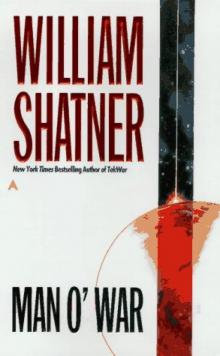 Man O' War
Man O' War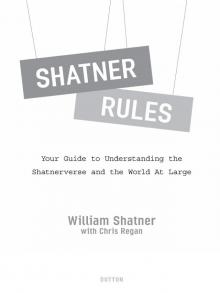 Shatner Rules
Shatner Rules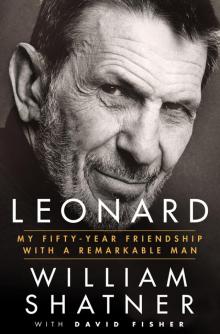 Leonard
Leonard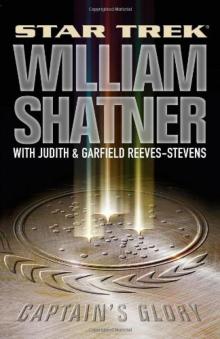 Captain's Glory
Captain's Glory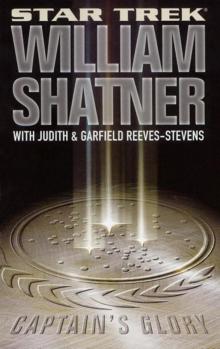 Captain's Glory зпвш-9
Captain's Glory зпвш-9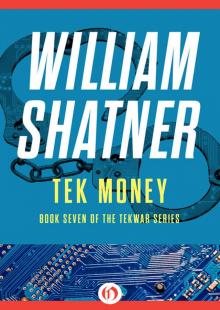 Tek Money
Tek Money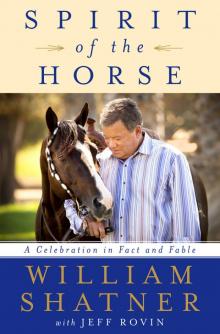 Spirit of the Horse
Spirit of the Horse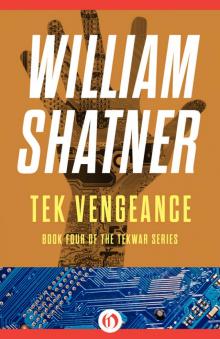 Tek Vengeance
Tek Vengeance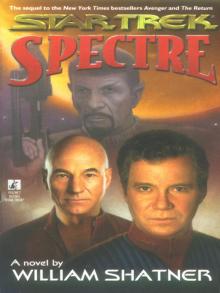 Spectre
Spectre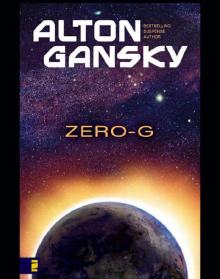 Zero-G
Zero-G Tek Kill
Tek Kill Collision Course
Collision Course TekLab
TekLab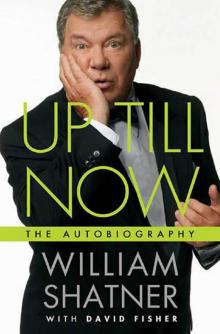 Up Till Now
Up Till Now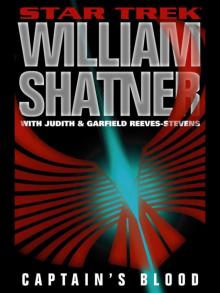 Captain's Blood
Captain's Blood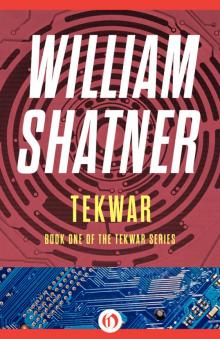 TekWar
TekWar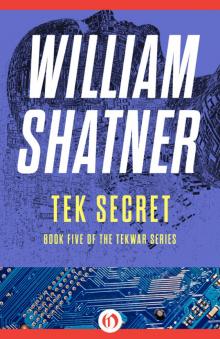 Tek Secret
Tek Secret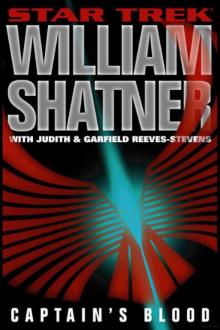 Captain's Blood зпвш-8
Captain's Blood зпвш-8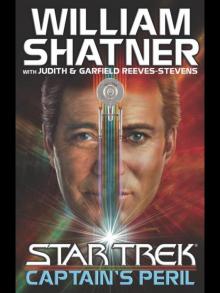 Captain's Peril
Captain's Peril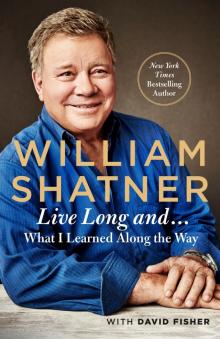 Live Long and . . .
Live Long and . . .